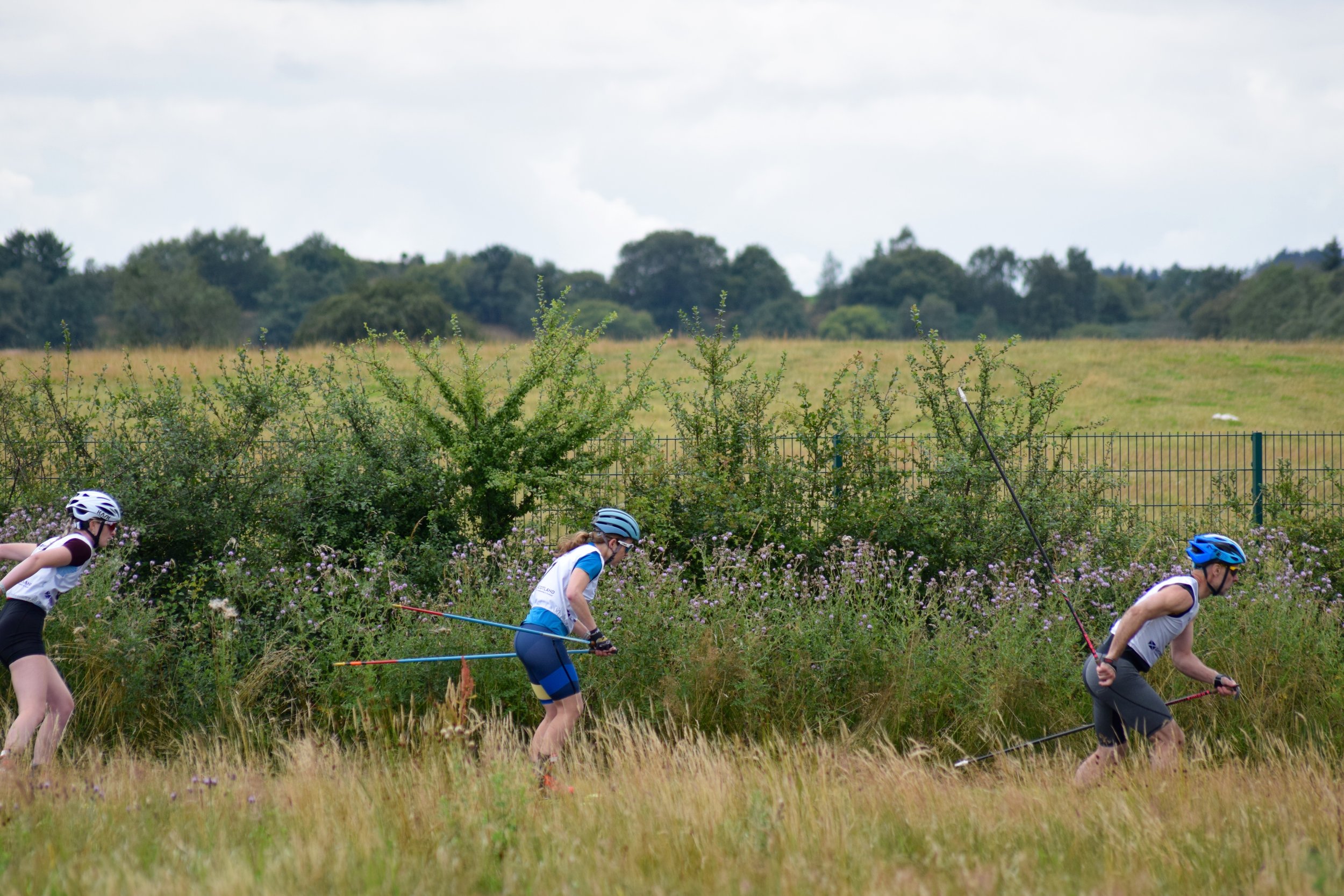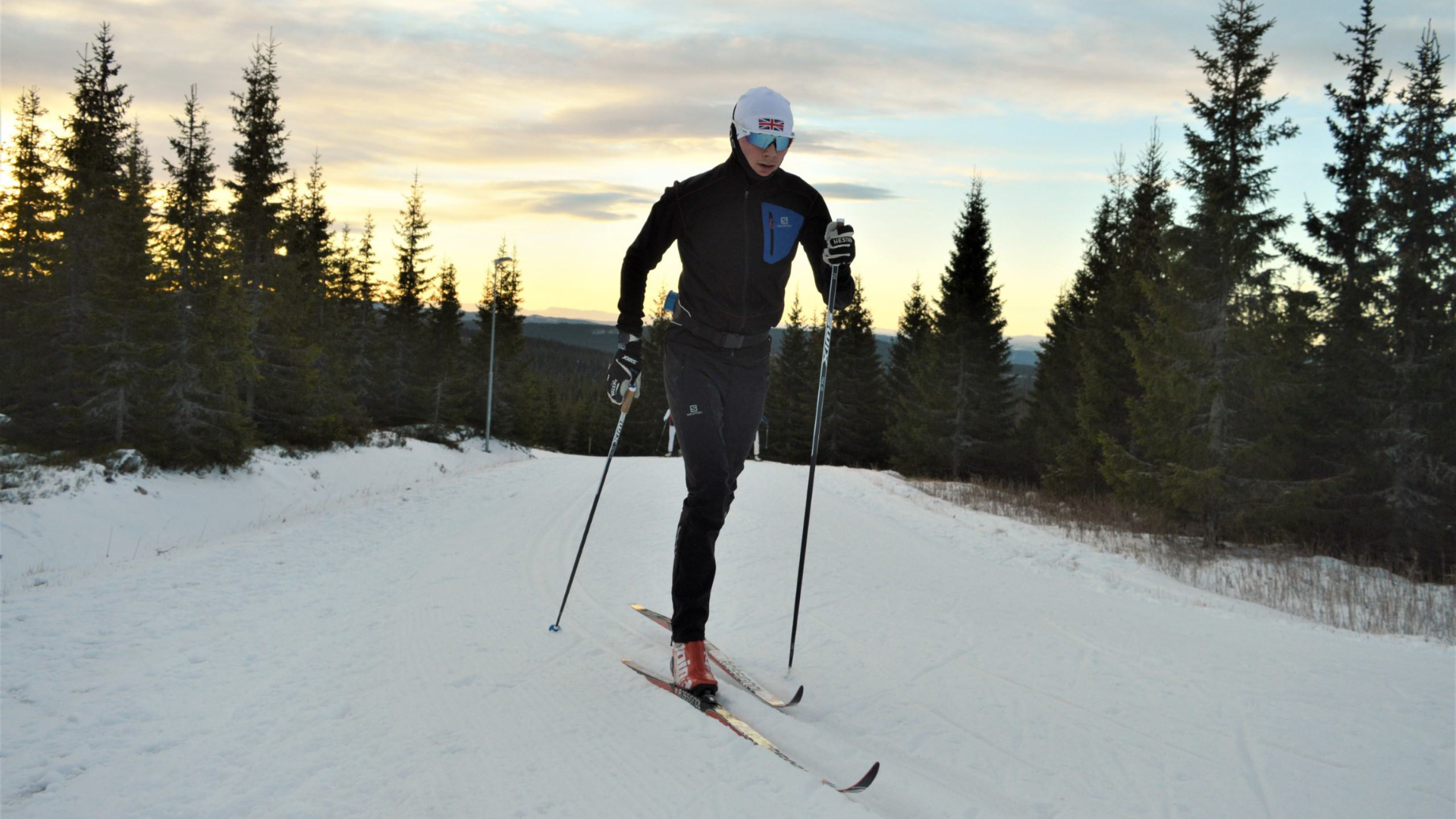
Cross Country & Roller Ski
Experience the great outdoors at your own pace…
CLUBS
ROLLER SKI SERIES
TEACH
PERFORMANCE
AWARDS
What is cross-country skiing?
Cross-country skiing is a form of skiing where skiers rely on their own locomotion to move across snow-covered terrain, rather than using ski lifts or other forms of assistance. Cross-country skiing is widely practiced as a sport and recreational activity; however, some still use it as a means of transportation.
Cross Country or Nordic Skiing
There are two techniques used for cross-country skiing; Classic and Skate. As a cross-country ski technique, skating is actually comparatively young, first being used in the 1980s. Classic, on the other hand, has been included in the Olympics since 1924. Classic technique is comparable to running with alternate arms and legs propelling the skier forward up a twin-cut spur. Skate technique is more akin to ice-skating, roller blading and speed skating with power from the legs being generated
Roller Ski
Cross-country skiing is participated in year-round across Scotland with the aid of roller skis, which are short skis with wheels. Roller ski technique is a very close approximation to cross-country skiing on snow, but practiced on tarmac. Challenging and fun in its own right, roller-skiing is great for those looking to learn cross-country ski basics, as well as those looking to hone their skills or keep in shape over the summer.
Dry Matting
Currently there is one purpose built dry mat for cross-country skiing, located at the Huntly Nordic and Outdoor Centre. The striding lanes, and figure of eight loop (including a little hill over a bridge) provides 400 m of track ideal for first timers looking for an introduction to classic technique to more experienced skiers who are looking for a challenging training session.
Where to start?
HUNTLY NORDIC AND OUTDOOR CENTRE
HNOC is Britain’s only purpose-built all-weather facility for cross-country skiing and roller skiing, providing tuition at all levels from novice to elite. The facility is run by Aberdeenshire Council.
Skis and roller skis (with boots and poles) are available for hire for use on the dry ski track and the roller ski track at the Huntly Nordic & Outdoor Centre. When there’s snow, skis, boots and poles can be rented by the day or half day for use on the trails in the Clashindarroch Forest or other local trails.
The great Scottish outdoors provide the perfect playground for cross-country skiing, the all-terrain snowsport that you do at your own pace. One of the best ways to start cross country or roller-skiing is to take part in some beginners lessons. Once you’ve got the start of a good practice, you could look at enhancing your skills on tracks around Scotland.
FIFE NORDIC SKI CLUB
Based at Fife Cycle Park in Lochgelly, the new Fife Nordic Ski Club is for all ages and abilities.
During the lighter months, they put on beginner four week courses in rollerskiing, and they look to do more cross country skiing into the winter months.
Their club meetings are on a Monday evening from 7pm to 9pm with equipment and coaching available for everyone. We would recommend attending a beginners course, if you are new to the sport, before attending the club sessions.
Where to go?
In winter, the Clashindarroch Forest provides some of the best snow holding trails in the UK whilst Glencoe Mountain has some cross country skiing equipment available for rental and on occasion cross country skiing tracks are prepared on the plateau.
Glenmore Ski trails are provided by the Glenmore Cross Country Ski Machine. This is run as a charity to provide high quality ski tracks in Glenmore Forest near Aviemore for the use of all cross country skiers.
Equipment
Skate
Skate skis are typically shorter than classic skis and the poles are longer, reaching to between the skier’s shoulder and nose. The boots provide ankle support and are stiffer along the sole.
Skate roller skis are typically slightly shorter than classic roller skis and have wheels that are free to roll backwards as well as forwards.
Specific equipment has been developed for each technique. For both classic and skate, boots attach to the ski binding at the toe only, allowing a wide-range of motion and free heel. The equipment for both techniques is also lightweight – especially in comparison to alpine ski equipment. New cross-country and roller ski equipment can be bought online or at specialised sport shops in Scotland. Second-hand gear is also available from club kit sales or centre ex-rentals.
Classic
Classic skis tend to be slightly longer and cambered so that the central section makes contact with the snow when the skier kicks down on the ski. Forward propulsion is generated by the ski gripping the snow, which can be achieved through a variety of different technologies such as fishscales (notching in the base), hairiesor zeros (fibrous hairs on the base) or wax (sticky tub wax corked onto the base). The poles are slightly shorter, coming up to the skier’s armpits and the boots have minimal ankle support and are very flexible at the toe.
Classic roller skis have a ratchetted front wheel to prevent the ski rolling backwards and providing the grip equivalent to the central section of a ski.
Scottish Roller Ski Series
The Snowsport Scotland Roller Ski Series typically aspires to 6 annual roller ski races held across Scotland between May and October. Competitor’s 3 best results are used to determine the winners by series category. All roller ski races are open to all age groups. There is a novice competition for those new to roller ski racing, featuring shorter and confidence-building courses.
GB Roller Ski Series
If 6 races isn’t enough – there’s also a GB Roller Ski Series. Select races from the Snowsport Scotland Roller Ski Series and roller ski races held in England can earn competitors points towards winning the GB Roller Ski Series.
There is also an annual GB Roller Ski Championship, which is held at a different venue each year.

Want to get competitive?
Cross-country ski racing is often touted as one of the most physically demanding competitive sports and renowned as winter cross-training for triathletes, runners and rowers.
Our XC performance programme supports athletes transitioning from train-to-train into train-to-compete. The annual programme consists of summer and winter camp training opportunities, including Project Lillehammer, and training planning support for our Snowsport Scotland Performance Squad. The Performance Squad comprises Youth, Junior and U23 athletes gaining experience training abroad and competing in international races and championships.
Snowsport Scotland employs two cross country coaches to support the progression of cross country ski athletes through the pathway and into the GB Snowsports teams. This is done in partnership with Clubs, GB Snowsports and the British Nordic Development Squad.
Please check our Clubs page to get in touch with your local cross country skiing or roller ski club or contact one of cross country coaches to find out about our national programmes.
National Performance Coach – Fern Cates
fern@snowsportscotland.org










